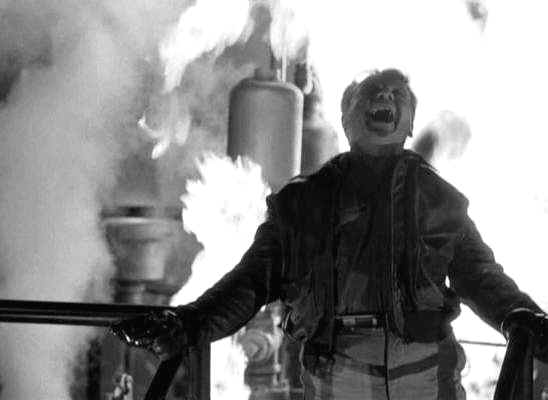 Spot the traitor.
Spot the traitor.Film Review Archive (date seen: October 7, 2010)
Perfectly balanced World War II film (or a POW film to be more specific) with the elements of comedy and drama contrasting and merging at the same time to great effect. On one hand, the whole humorous tone of the film is incredibly, almost single-handedly carried by the characters of Shapiro and Animal (Harvey Lembeck and Robert Strauss, respectively). While the complex tone of human spirit and survival against all odds flawlessly embodied by William Holden (in an Oscar-winning performance) as J.J. Sefton on the other.
In the expansive magnitude of films such as those of the war genre, it's very rare for a picture of this kind to play with the "whodunit" plot device. But the screenplay (based on a theatrical play) has brought the film into its revelatory climax without being very obvious of what (or who) it is pertaining to.
Besides its thrilling suspense and trivial comedy contained throughout as it heads into a surprise ending, "Stalag 17" also shows the side of soldiers unblemished even by captivity; that of their extreme devotion of preserving a much-admired "war hero"(Lt. Dunbar) from certain death.
But once they looked at J.J. Sefton with disdain and brow-raising judgments, both to his stance, his cigarette-trading antics and their hunch of him being a "stoolie", they never were aware that they're looking at yet another hero. He conforms with his captors, he's a loner in their ranks, but his ultimate gallantry's what really counts.
In the expansive magnitude of films such as those of the war genre, it's very rare for a picture of this kind to play with the "whodunit" plot device. But the screenplay (based on a theatrical play) has brought the film into its revelatory climax without being very obvious of what (or who) it is pertaining to.
Besides its thrilling suspense and trivial comedy contained throughout as it heads into a surprise ending, "Stalag 17" also shows the side of soldiers unblemished even by captivity; that of their extreme devotion of preserving a much-admired "war hero"(Lt. Dunbar) from certain death.
But once they looked at J.J. Sefton with disdain and brow-raising judgments, both to his stance, his cigarette-trading antics and their hunch of him being a "stoolie", they never were aware that they're looking at yet another hero. He conforms with his captors, he's a loner in their ranks, but his ultimate gallantry's what really counts.










